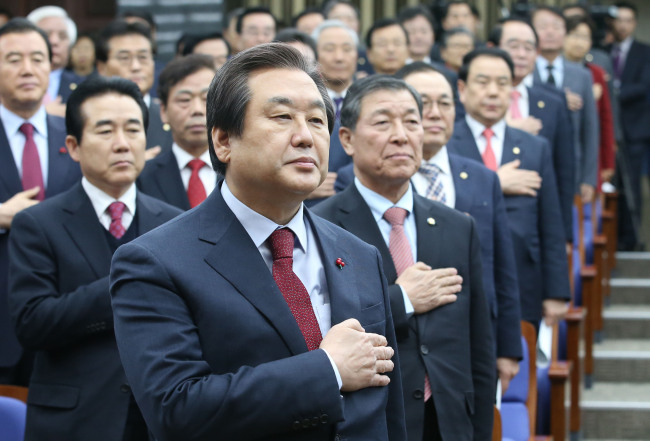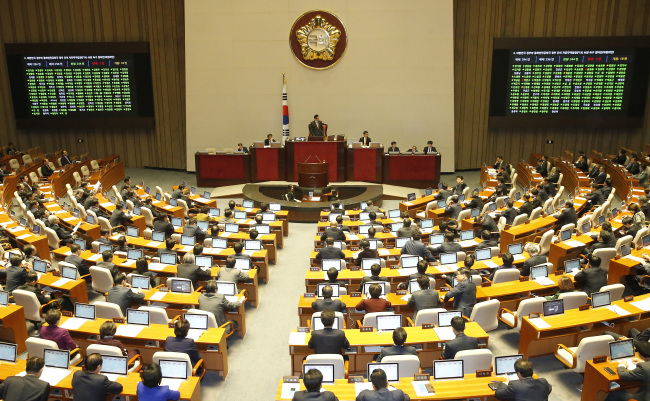With fewer than 100 days until South Korea holds its April general elections, debates have erupted regarding whether or not the ruling party can seize a supermajority status in the National Assembly.
The ruling Saenuri Party has reiterated that it would win 180 out of the 300 parliamentary seats, a number that allows the party to pass contentious legislation without reaching a consensus with the minor ones.
According to the National Assembly Act Articles 85 and 86, pending bills cannot be put to a vote in the plenary session without the approval of three-fifths of the attending lawmakers. The Saenuri Party holds 156 seats and the main opposition Minjoo Party of Korea has 118.
“Though it sounds a bit ambitious, we should aim to secure more than 180 seats,” ruling Saenuri Party leader Rep. Kim Moo-sung said last Monday. “(This number) is needed to neutralize the parliamentary law that paralyzes the nation. … If the ruling bloc remains united, we will surely win the election,” said Kim.
The ruling Saenuri Party has reiterated that it would win 180 out of the 300 parliamentary seats, a number that allows the party to pass contentious legislation without reaching a consensus with the minor ones.
According to the National Assembly Act Articles 85 and 86, pending bills cannot be put to a vote in the plenary session without the approval of three-fifths of the attending lawmakers. The Saenuri Party holds 156 seats and the main opposition Minjoo Party of Korea has 118.
“Though it sounds a bit ambitious, we should aim to secure more than 180 seats,” ruling Saenuri Party leader Rep. Kim Moo-sung said last Monday. “(This number) is needed to neutralize the parliamentary law that paralyzes the nation. … If the ruling bloc remains united, we will surely win the election,” said Kim.

History, however, has played out against the ruling party’s hopes. Never in the past 20 years has a single political party gained 180 seats.
The Grand National Party, the precursor to the Saenuri Party, took 121 and 133 seats in 2004 and 2000, respectively, before peaking at 153 seats in 2008 and, as the Saenuri Party, winning 152 seats in 2012.
Meanwhile, the then-ruling Uri Party and Millennium Democratic Party won 115 and 152 seats in 2000 and 2004. A splintered liberal bloc took 89 seats in 2008 while the Minjoo Party’s forerunner Democratic United Party gained 127 seats in 2012.
But there is one big difference in the upcoming elections: the emergence of an undivided conservative bloc. Unlike in the past elections when the right wing was divided, the 2016 election is highly likely to pit the single conservative Saenuri Party against multiple liberal opposition parties.
Mathematically, such conditions could set the stage for the Saenuri Party’s supermajority. In the 2008 elections, conservative parties attracted a cumulative 197 seats. The number was well past the 180 mark and even near 200 seats, with which the majority party can unilaterally pursue constitutional change.
The scenario was even cautioned by the opposition’s presidential hopeful. “Our primary goal is to prevent the Saenuri Party from seizing more than 200 seats,” said Rep. Ahn Cheol-soo, an independent lawmaker who seeks to create a third party that could rival the Saenuri Party in the elections.

Some experts noted that the Saenuri Party would secure 180 seats in the elections, if the ruling party remains united and the opposition remains fragmented.
Since Ahn left the main opposition Minjoo Party last month, his up-and-coming party has threatened the Minjoo’s foothold. According to the survey released by local pollster Realmeter on Monday, the Minjoo’s approval rating is 23.6 percent with Ahn’s party recording 17.3 percent.
“It is all about how much impact Ahn’s new party will have. If it grows as big as the Minjoo Party, the Saenuri Party can play both ends against the middle and come out the winner with more than 180 seats,” said politics professor Yoon Sung-yi at Kyung Hee University.
Bae Jong-chan, senior analyst of Research and Research, downplayed the likelihood of the Saenuri Party winning a supermajority. He noted that the 180-seat goal is hardly achievable, unless both the Saenuri Party and President Park Geun-hye’s approval ratings rise above 50 percent and Ahn’s new party’s rating falls below 10 percent.
According to the Realmeter poll, the Saenuri Party earned approval ratings of 38.6 percent while 42.5 percent of respondents described Park’s job performance as “positive.” Both the numbers are below the 50 percent mark that the analyst cites as a requirement for the 180-seat victory.
Meanwhile, some Saenuri heavyweights urged the party to take a more cautious approach. The fifth-term lawmaker Rep. Lee Jae-oh said the voters are not “naive” enough to give the ruling party an election victory with 180 or 200 seats.
Lee Chung-hee, politics professor at Hankuk University of Foreign Studies, echoed the warning. “Given the voter’s frustration over the politics, the ruling party should tell them about its solution to address the issue. Touting the number of seats they want to get in elections doesn’t look good,” he said.
By Yeo Jun-suk (jasonyeo@heraldcorp.com)


















![[Today’s K-pop] Treasure to publish magazine for debut anniversary](http://res.heraldm.com/phpwas/restmb_idxmake.php?idx=642&simg=/content/image/2024/07/26/20240726050551_0.jpg&u=)